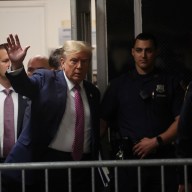 Jonah Hill and Channing Tatum spring break, y’all, in “22 Jump Street.”
Jonah Hill and Channing Tatum spring break, y’all, in “22 Jump Street.”
Credit: Glen Wilson
’22 Jump Street’
Directors: Phil Lord and Chris Miller
Stars: Jonah Hill, Channing Tatum
Rating: R
4 (out of 5) Globes
Any sequel should be a mess of anxieties and nerves, freaking out about why it needs to exist (beyond money) and what it will do differently, if anything. Most don’t care about such matters, but “22 Jump Street” does. And it should be worried: 2012’s “21 Jump Street” was a flash-in-the-pan effort — a comedic (and basically, productively disrespectful) take on an old TV favorite with a duo so mismatched that they were bound to produce chemistry. No one expected much from it, and directors Phil Lord and Chris Miller — as they did with “The Lego Movie” — produced fathoms more than was required. How do you top that? Can you?
“22 Jump Street” puts these questions in the film itself, often in the words of characters. In mockery of the almost doubled budget, the program’s HQ has been moved across the street to bigger, more pointlessly expensive digs. As promised/threatened at the end of the first, undercover cops Schmidt and Jenko (Jonah Hill and Channing Tatum) are going to college. But they’d rather not: They’d rather be “Bad Boys”-style, two-gun-wielding action gods. Instead they find themselves remarking about the similarities of their new misadventures, and sometimes about the differences. At one point, as they find themselves distracted by sex and weight lifting, they note that it was a lot easier to find the drug dealers the first go around.
This is far from the first self-aware sequel. It would almost be more clever to be not meta, as self-aware sequels have already, in our hyper-aware future, become a cliche. But the meta jokes aren’t there because the film is being hip; they’re all borne out of anguish. It doesn’t want to be another dumb sequel. This quickly green-lit follow-up worries it’s not as good, not as funny, not as original and that it exists to merely recreate that great time moviegoers experienced two years prior. It crams so many self-aware jokes into its running time that the sheer volume of them becomes part of the joke. (Of course, some of the jokes themselves are, you know, funny too, including a particularly transcendent closing credits sequence.)
 Ice Cube has a bit more to do (and a bigger, more pointlessly flashy office) in “22 Jump Street.”
Ice Cube has a bit more to do (and a bigger, more pointlessly flashy office) in “22 Jump Street.”
Credit: Glen Wilson
The anxiety is good, though; it inspires it to be funnier. Granted, it’s not all sequel jokes. Despite its fears, “22 Jump Street” does feature real progress. Schmidt and Jenko are split up again, but this time they wonder if they’re even a good team — if this odd couple wouldn’t be better off with more similar partners. Jenko quickly bro-falls for a football bro, in one of many jokes that draw a line between homoerotic and mere gay panic. Sometimes it seems this comedy sequel is asking us to read this as getting at something deeper, using sex jokes and beer pong jokes to inquire into the nature of relationships, asking if our real soul mates are the ones who are nothing like us.
By now we know the beefcake, square-jawed Tatum is actually even goofier than Hill, and bits like him talking about “the anals of history” are simply more in what should be a long career as a not-so-secret cut-up. The freshness is gone, but “22 Jump Street” is a consistently funny and inventive reminder that comedy (or anything) isn’t strictly about being fresh. It’s about quality. That remains high, even if the jokes about college — filled with the expected frat parties and the less expected slam poetry, which is still a thing, apparently — remain the only items that are less than incredibly inspired.
Follow Matt Prigge on Twitter @mattprigge













